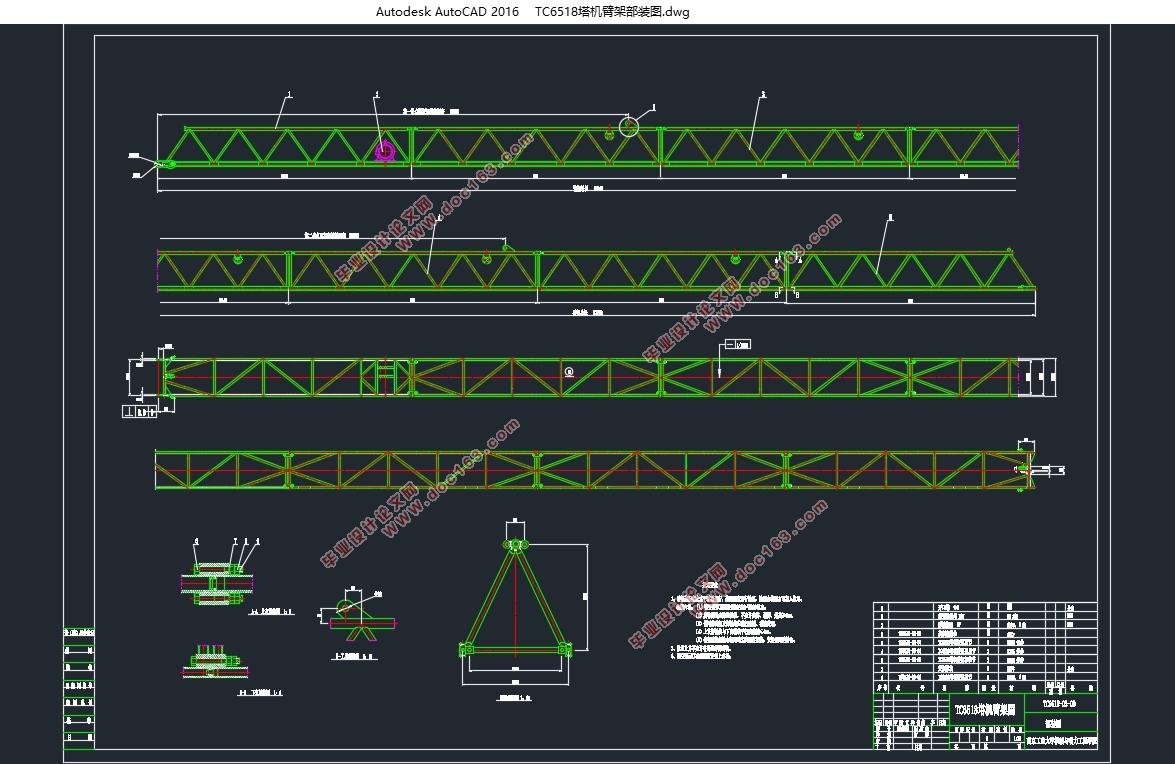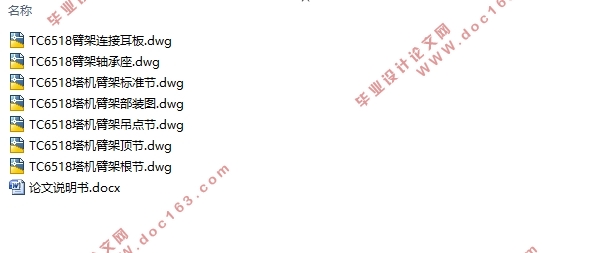TC6518型塔机起重臂结构设计(含CAD图)

1.无需注册登录,支付后按照提示操作即可获取该资料.
2.资料以网页介绍的为准,下载后不会有水印.资料仅供学习参考之用.
密 惠 保
TC6518型塔机起重臂结构设计(含CAD图)(论文说明书10000字,CAD图7张)
摘要
塔式起重机作为一种搬运机械,是现代工业与民用建筑的最主要的施工机械之一,其最重要的特点就是相比于其他机械幅度利用率更高。塔式起重机的金属结构主要由塔帽、起重臂架、平衡臂架、回转支承架、塔身、底架等部件组成。它还具有使用范围广,回转半径大,起升高度高,效率高,操作简便,安装和拆卸方便等特点,目前在我国建筑安装工程中使用非常普遍,尤其在高层建筑和普通民用建筑中,已经成为不可替代的建设机械
塔式起重机臂架的设计是一种钢结构的设计,臂架主要是由上弦杆、下弦杆、腹杆和拉杆构成,参考最新发布的塔式起重机设计规范设计时需要考虑到以上各部分的组成结构和具体尺寸、材料等。通过计算及校核,最终确保臂架的强度、刚度和稳定性都能满足国家规定要求。在能安全工作的前提下尽力降低制造成本,使设计出的产品既安全可靠又价格低廉。
关键词:臂架,拉杆,弦杆,腹杆,强度,刚度,稳定性
Abstract
As a kind of transport machine, tower crane is one of the most important construction machines in modern industrial and civil buildings. The metal structure of tower crane is mainly composed of tower cap, lifting arm frame, balance arm frame, rotary support frame, tower body and bottom frame. It also has a wide use, the turning radius is big, high hoisting height, high efficiency, easy operation, convenient installation and disassembly, etc, has been widely used in construction and installation engineering in our country at present, especially in high-rise building and ordinary civil buildings, has become an irreplaceable construction machinery
[资料来源:THINK58.com]
The design of the tower crane boom is a kind of steel structure design, the arm frame is mainly composed of upper chord and bottom chord, CHS and pull rod, refer to the latest release of tower crane design specification design need to consider the above composition structure and the specific size of each part, material, etc. Finally, the strength, stiffness and stability of the boom can meet the requirements of national regulations through calculation and verification..We will try our best to reduce the manufacturing cost on the premise of working safely, so as to make the designed products safe, reliable and cheap.
Keywords: arm, draw bars, oblique abdomen, chord, strength, stiffness, stability


目录
摘要 I
Abstract II
第一章绪论 1
1.1塔式起重机概述及国内外发展现状 1
1.2未来趋势 3
1.3起重臂优化的发展 3
第二章方案构思 5
2.1臂架整体构思 5
2.2分节问题 6
2.3断面型式 6
2.4腹杆布置 7
2.5杆件选材及结构 7
2.6拉杆构造 7
2.7减轻臂架自重的途径 8
2.8最终方案 8
第三章主要结构参数设置 9
3.1 主要结构尺寸 9
3.1.1 标准节的长度及臂架长度 9
3.1.2材料 9
3.2吊点位置的确定 9
3.2.1选择参数计算 9
3.2.2吊点调整 10
第四章计算校核 11
4.1计算 11
4.1.1截面几何特性 11
4.1.2垂直载荷产生的力 12
4.2自重产生的内力 13
4.3动载荷端点处的力 15
4.4 动载荷在近吊点内产生的力 16
4.5其它偏心力矩 17
4.6水平载荷产生的内力 18
4.6.1风载臂架 18
4.6.2风载重物(D处) 20
4.6.3重物振动侧向力(D处) 20
4.6.4重物回转(D处) 21
4.6.5臂架自重惯性力(跨中) 22 [资料来源:http://think58.com]
4.7内力计算 23
4.8校核 28
4.8.1确定许用应力 28
4.8.2对拉杆的校核 29
4.8.3截面校核 30
4.8.4腹杆校核 31
4.8.5稳定性校核 33
第五章附件设计 37
5.1连接部分 37
5.1.1根部 37
5.1.2臂架节之间的连接 38
5.1.3上弦杆连接部 40
5.2滑轮选用 41
5.3一些说明 42
5.3.1拉杆长度 42
5.3.2焊接问题 42
5.4造价经济分析 44
参考文献 46
致谢 48 [资料来源:http://www.THINK58.com]
